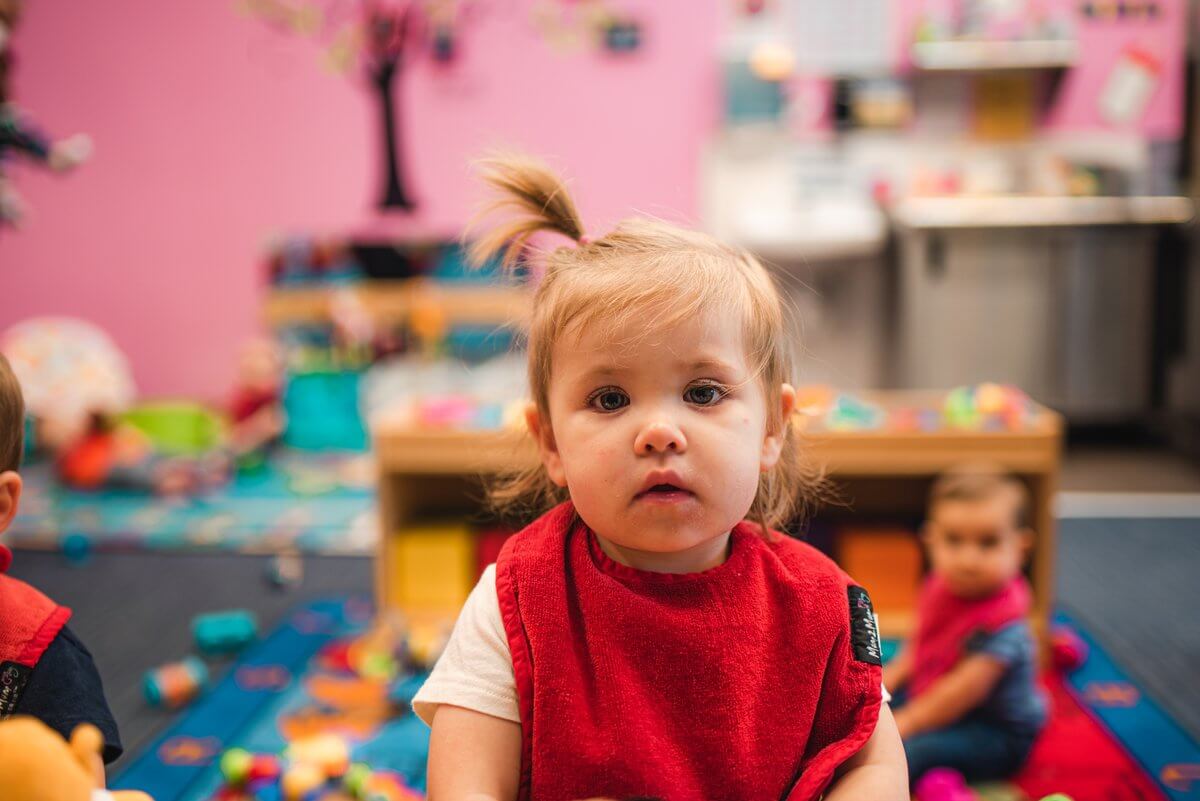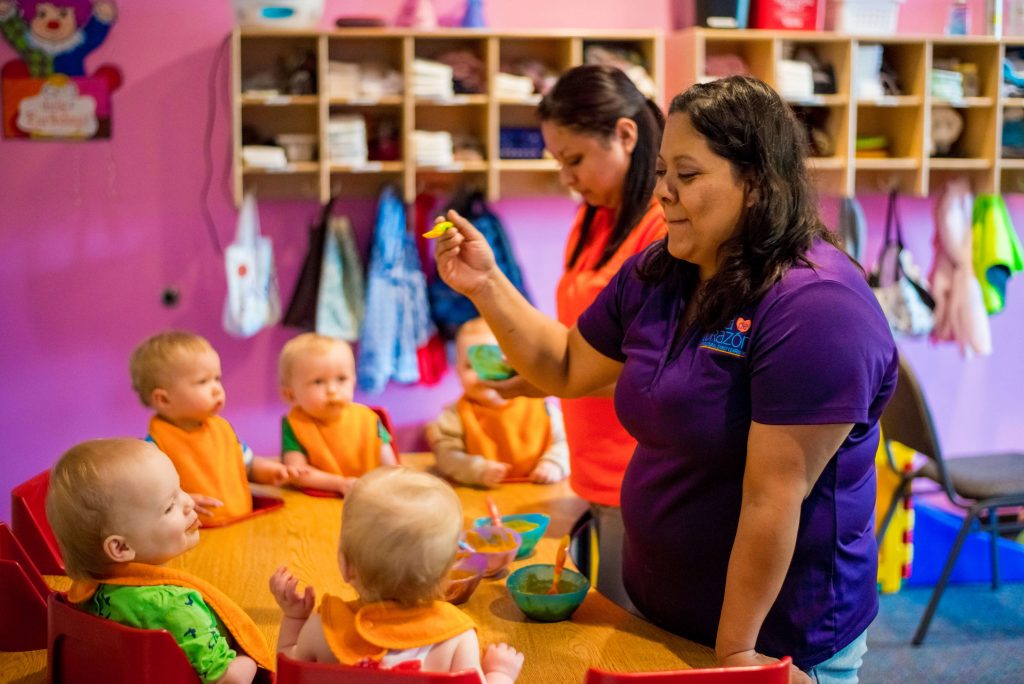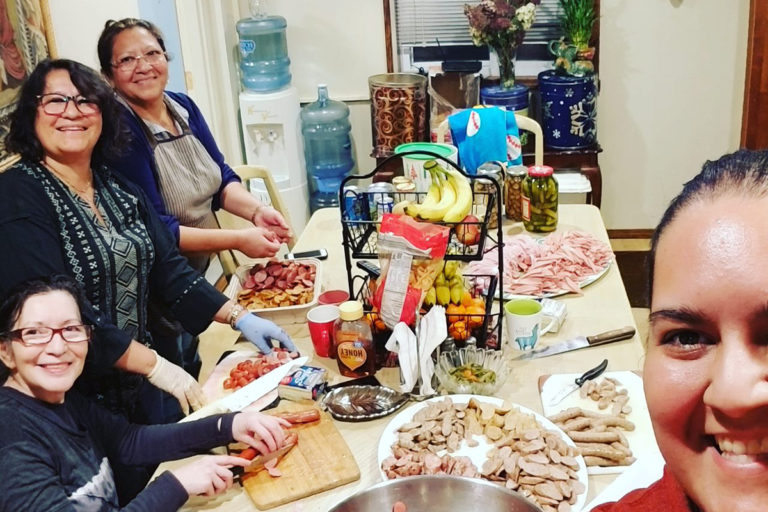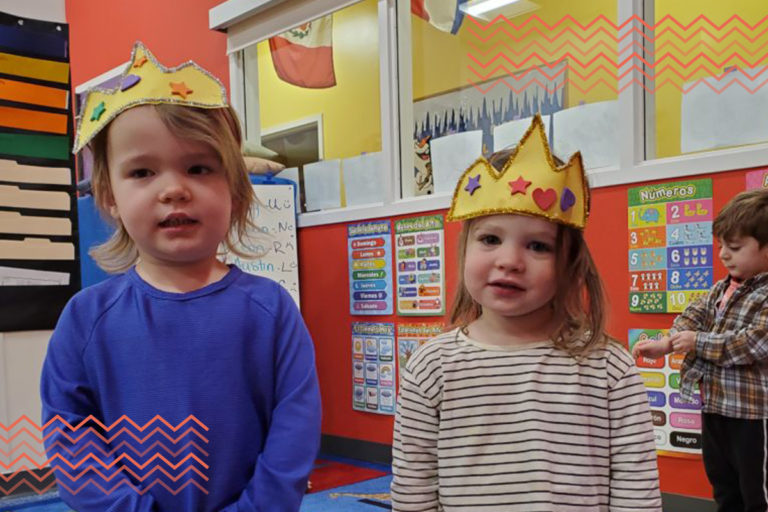What Do Babies Learn in Daycare?

Parents often ask: What do babies really learn in daycare? At first glance, it might seem that infants are simply being cared for — eating, napping, and playing. But research shows that the earliest years of life are the most critical for brain development, with up to 80% of brain growth happening before age three.
Daycare is much more than a place for supervision; it can be an enriching environment that nurtures learning, development, and connection. At Casa de Corazón, we believe babies are natural learners. Every cuddle, smile, and playful interaction builds the foundation for lifelong skills.
Social and Emotional Development
One of the most important things babies learn in daycare is how to connect with others. Through daily routines and group care, infants begin developing trust, empathy, and emotional security.
In high-quality infant programs, consistent caregivers help babies feel safe and loved. This secure attachment allows children to explore and grow confidently.
“Even the smallest babies are learning how to build relationships. In our infant classrooms, we emphasize consistency and responsiveness so every child feels nurtured and secure.” — Casa Teacher
Predictable Routines: Nutrition, Daily Schedules, and Naps
At Casa de Corazón, nutrition is an important part of infant care. Fresh, organic food is prepared on-site daily in Casa’s commercial kitchen, and meals are designed to be both nutritious and developmentally appropriate. Lunch purées are made fresh, and snacks are chosen to encourage self-feeding as babies develop fine motor skills.
Sample Infant Menu:
- Breakfast: Multigrain Cereal, Pear-Apple Sauce
- Lunch: Zucchini Purée & Cottage Cheese
- Snack: Quinoa Stars & Banana
For infants on breast milk or formula, each classroom includes a refrigerator for safe storage. Casa supplies bottles for every child, but parents are always welcome to bring their own if they prefer.
“Meals are more than nutrition — they’re learning opportunities. We use snack and mealtime to model self-feeding, introduce new vocabulary, and make every child feel included.” — Casa Teacher

Infant Activities and Daily Rhythm
Infant schedules are designed to be flexible, following each baby’s cues for naps, feeding, and play while offering a consistent rhythm to the day. Babies enjoy a variety of indoor and outdoor experiences depending on the season and weather.
Indoor Play: Each center has an infant-friendly indoor gym with safe, age-appropriate equipment.
Outdoor Exploration: In warmer months, infants enjoy fresh air on the playground, buggy rides around the neighborhood, and trips to nearby parks.
Enrichment Experiences: Even the youngest children participate in Casa’s enrichment activities, such as family appreciation events, cultural celebrations, and visits from special guests and volunteers.
A Sample Infant Schedule at Casa de Corazón
From the moment you drop off your child in the morning to when you pick them up in the evening, they will enjoy a day filled with caring connections with their teachers in a safe environment for learning.
- 7:00–7:30 a.m. – Meaningful hellos and goodbyes
- 8:00 a.m. – Breakfast
- 9:00/9:30 a.m. – Buggy ride, park, gym, or large group reunion
- 10:00 a.m. – Morning nap
- 11:00/11:30 a.m. – Lunch
- 12:00 p.m. – Directed play and small group activities
- 1:00 p.m. – Buggy ride, park, gym, or large group reunion
- 1:30 p.m. – Afternoon nap
- 3:00 p.m. – Snack
- 4:00 p.m. – Directed play and small group activities
- 5:00/5:30 p.m. – Meaningful hellos and goodbyes
Language and Communication Skills
Daycare introduces babies to a world rich in language. Teachers talk, sing, and read to infants, helping them associate sounds with meaning. Even before speaking, babies practice communication through babbling, gestures, and eye contact.
Exposure to multiple voices — and in Casa’s case, bilingual Spanish immersion — accelerates vocabulary development and strengthens cognitive flexibility.
“Language learning starts long before a child says their first word. In our Spanish immersion classrooms, infants hear two languages every day, which builds strong communication skills from the start.” — Casa Teacher
Motor Skills and Physical Development
From tummy time to crawling, daycare gives babies plenty of opportunities to practice movement. Teachers create safe, stimulating spaces with age-appropriate toys that encourage grasping, rolling, and exploring.
Fine motor skills (like reaching for a rattle) and gross motor skills (like learning to crawl) are both supported by intentional play. These physical milestones not only build strength but also boost confidence.
Cognitive Growth and Curiosity
Babies are natural scientists. In daycare, infants learn cause-and-effect through play, problem-solving by exploring new toys, and memory skills through repetition. Structured activities like music, sensory bins, and simple games spark curiosity while building brain connections.
Research shows that “serve and return” interactions — when an adult responds to a baby’s coos or gestures — are fundamental for cognitive development. In group care, infants benefit from both caregiver responses and observing peers.

Early Socialization
Even at just a few months old, babies are watching and learning from one another. Daycare gives infants early exposure to peer interaction, which helps them practice important skills like sharing attention, mimicking sounds, and expressing emotions.
These early moments of social learning set the stage for empathy, cooperation, and friendship as children grow.
Cultural Awareness and Diversity
At Casa, children are immersed not only in a bilingual environment but also in a celebration of diverse cultures. For babies, this means exposure to songs, stories, and routines from around the world, helping them grow up with an appreciation for community and global citizenship.
“Even infants benefit from being part of a culturally rich environment. Music, language, and celebrations introduce them to diversity in a joyful way.” — Casa Teacher
Partnering with Families
Daycare learning doesn’t end when the child goes home. Programs that share updates and encourage collaboration with families create consistency that reinforces development.
The Casa App keeps parents connected with daily updates, photos, and notes about meals, naps, and milestones, so families can continue supporting learning at home.
Frequently Asked Questions About Babies in Daycare
Is daycare good for infants?
Yes! Studies show that high-quality daycare supports healthy development. With nurturing caregivers and structured routines, infants build emotional security, social skills, and early cognitive foundations.
What’s the best age to start daycare?
Many families enroll babies as early as 6 weeks, while others wait until closer to 12 months. The right age to enroll your child in daycare depends on your family’s needs, work schedules, and the quality of the daycare program.
What do babies do all day in daycare?
Infant daycare days include feeding, naps, diapering, and lots of play. Activities like tummy time, singing, reading, sensory play, and peer interaction make each day meaningful and engaging. Learn more about the Casa Creative Curriculum.
How does daycare affect bonding with parents?
Daycare doesn’t replace a parent’s role — it complements it. Secure attachment comes from consistency and love. Families can support bonding by maintaining routines at home, spending quality time together, and staying connected through tools like the Casa App.
Final Thoughts
So, what do babies learn in daycare? They learn to trust, to communicate, to move with confidence, to explore with curiosity, and to connect with the world around them. These early lessons may look like simple moments of play or care — but they are shaping the foundation of who your child will become.
If you’re interested in learning more about how Casa de Corazón nurtures infant development through bilingual immersion and responsive care, we invite you to request a tour and see our programs in action.


